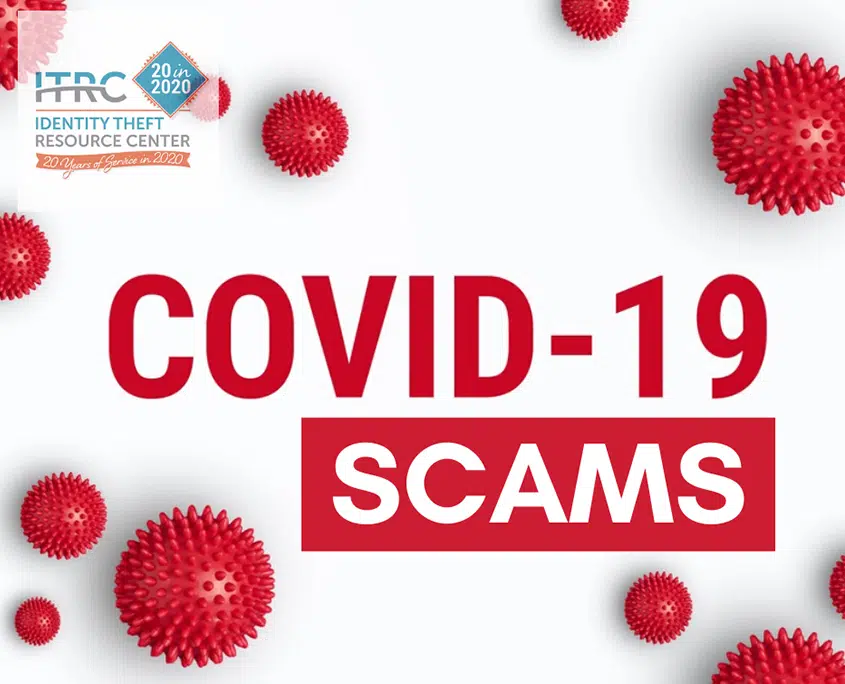Is this a COVID-19 Scam? Find Out with These Tips
Home Help Center Is this a COVID-19 Scam? Find Out with These Tips

As the COVID-19 pandemic continues to grow and seriously impacts everyone across the country, so do the number of COVID-19 scams that will pop-up trying to get access to personally identifiable information (PII) and finances. It can be difficult to decipher which emails, phone calls, social media posts or text messages are scams versus legitimate ones. Scammers will always take advantage of new opportunities in a time of crisis like evictions and foreclosures assistance, unemployment benefits, stimulus payments, etc. Here are some tips to help navigate those emails, text messages and voicemails:
Go to the Source
Unsure if something is legitimate? Go to the source of the potential assistance. That means if the offer of unemployment benefits seems to be uncharacteristic, go directly to the employment development department and check their website. If it has to do with housing – whether that’s eviction or foreclosure assistance – head to that source (local housing commission, banking institution, etc.). Don’t trust an inbound message that isn’t verifiable.
Unsure of How a Fraudster Might Try to Get Consumers to Self-Compromise?
Based on experience, the ITRC anticipates that they will give these a go:
1. Government Checks: Consumers receiving an email or phone call from someone that claims they can ensure a check from the government for an individual right now; it is likely a COVID-19 scam. The government is still working on the details of how these funds will be made available as of the original date of this post. For specific details, consumers can always visit local, state or federal government websites to get the most accurate information.
2. Asking for Verification of PII: If someone calls asking for a Social Security number, driver’s license number, credit card number or bank account information, it is a high probability that it is a scam. Say “K, Bye”, hang up and call the company directly to see if the offer is legitimate. If it is real, they will have a record of the calls and offers that were made.
3. Pay Upfront for Government Assistance: The government will not ask consumers to pay upfront to get any of the relief money. Scammers have attempted this before with the “Federal Government Empowerment Money Program” scam.
4. Social Media: If consumers receive messages on a social media platform claiming to be the government for anything regarding COVID-19, anticipate that this is a COVID-19 scam, too. Report it to the social media platform and block the sender. The government does not contact individuals through social media. Additionally, posts or messages enticing individuals to “sign-up” to receive more information on how to get access to more information or funds should be considered gateways to compromising PII.
5. Emails: There are loads of phishing emails under the guise as COVID-19 help. If an email arrives that wasn’t expected, ignore it and go directly to the source to determine whether or not it is legitimate. Under no circumstances should consumers click on any links or open any attachments from unanticipated emails or texts. COVID-19 scams via phishing emails are going around right now attacking both businesses and consumers.
6. Phone Calls: COVID-19 phone scams are beginning to gain steam and something else consumers should be aware of. The advice for phone scams is pretty similar to email scams. Don’t answer calls from numbers you do not recognize and do not return calls from voicemails if you aren’t completely sure from whom the call originated. Should a call regarding COVID-19 assistance inadvertently get answered, say “K, Bye!,” hang up and directly call the source. Verify the legitimacy of the call.
7. Grandparent Scams: Grandparent scams have been around for a long time and play on the fear of loved ones. Recently, scammers have been posing as family members that are sick and need money to pay their medical bills. It is important for people to resist the urge to act, no matter how dramatic the story is. People should also never make a payment over email or the phone to someone they were not expecting to hear from. Instead, they should hang up and reach out to the mentioned loved one directly to see if they are okay.
Scammers Take Advantage of Public Events
Every time there is a crisis, natural disaster or newsworthy event, expect scammers to come out in full force looking to take advantage and play on the public’s fear of the unknown. It is important to not let scammers take advantage of us while scared and unsure of what to do. These tips should help reduce the risk of falling victim to a COVID-19 scam.
Contact ITRC For Free Assistance
You can call the Identity Theft Resource Center toll-free if you think you may have been a victim of any type of scam at 888.400.5530. You can also live chat with one of our expert advisors for assistance.
Don’t forget to download the ITRC’s ID Theft Help App to help in managing your identity crime case should you find that you are a victim of a scam.
Read more:
How much information are you putting out there? It’s probably too much. To help you stop sharing Too Much Information, sign up for the In the Loop.
Get ID Theft News
Stay informed with alerts, newsletters, and notifications from the Identity Theft Resource Center

